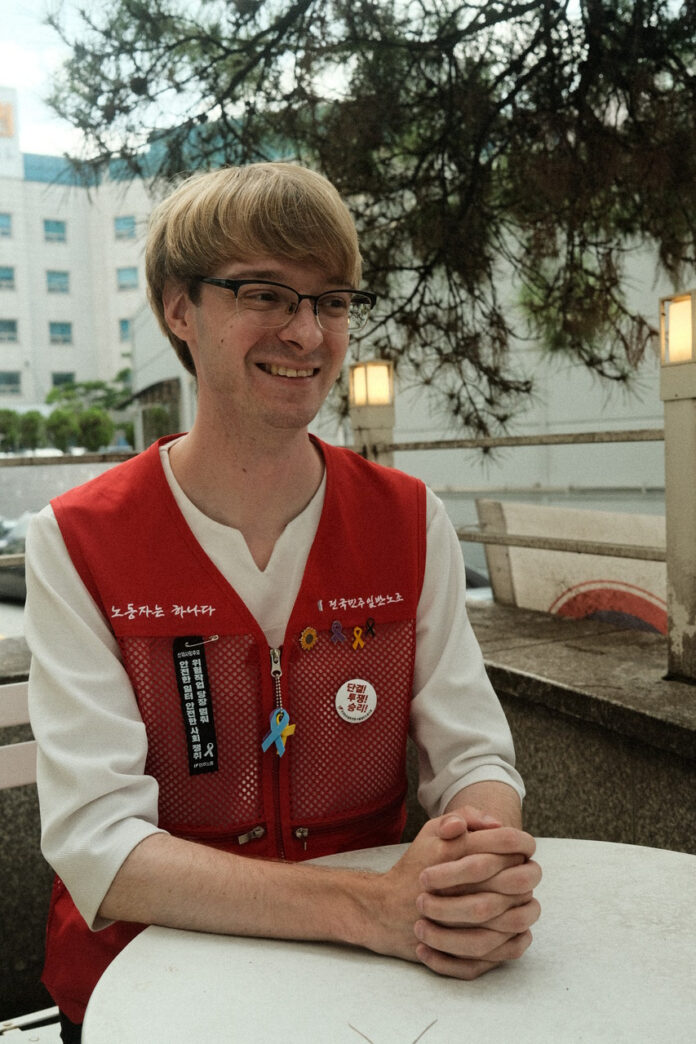On the afternoon of June 22, downtown Seoul’s Sejong-daero was filled with a sea of workers. It was the day of the National Workers’ Rally. Flags of all colors fluttered in the air. Among them, a banner bearing a unique inscription caught the eye: “Native Teachers’ Union” written in Korean. Beneath this flag, a group of people of various ethnic backgrounds gathered. They were members of the Native Teachers’ Union, affiliated with the General Union under the Korean Confederation of Trade Unions.
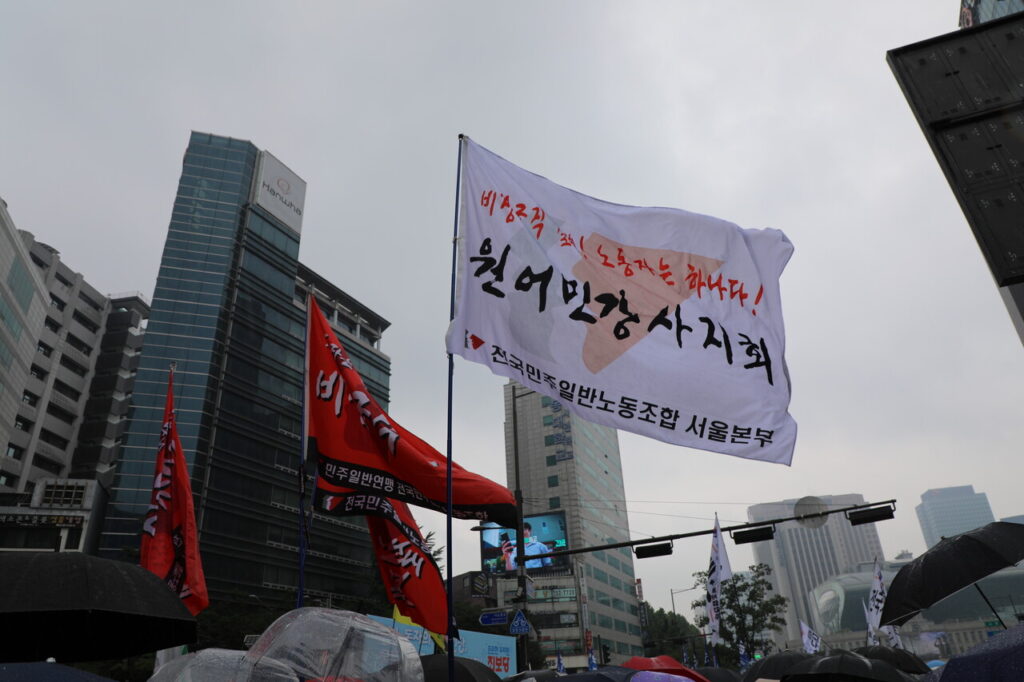
“Enact the Anti-Discrimination Law! End Racial Discrimination!”
A voice shouted these slogans in Korean. It was Austin Bashore (27) from the United States. That day, Austin stood at the front of the march, holding the flag high. By day, he teaches English to elementary school students at a private academy. He also runs a TikTok channel where he introduces Korean laws and culture to migrant workers. And whenever needed, Austin dons a red vest with a yellow ribbon and takes his place as a union member in Korea. He is the chair of the Native Teachers’ Union in the Chungcheong region.
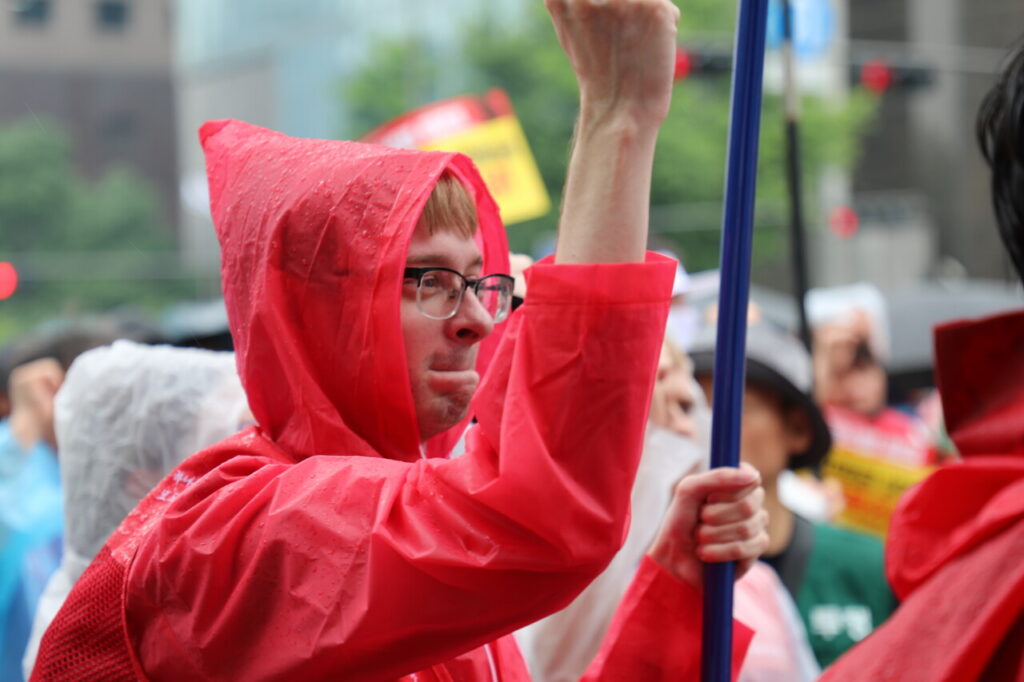
A Student Who Dreamed of Becoming a Teacher
Austin was born in 1997 and raised in a family that has been running a farm for generations in southeastern Ohio. Growing up in a peaceful rural town under a conservative upbringing, his life took a dramatic turn during his high school years.
In 2012, as a high school student, he stayed up late playing video games, where he first encountered Koreans in the gaming world. They introduced him to Korean culture and even shared a song called Bar Bar Bar by Crayon Pop, which was popular at the time. It remains his favorite song to this day. The lively rhythm of the song opened the door to the world of Korea for him.
It was also during this period that Austin developed a passion for social activism. The turning point was a high school political science class. “That’s when I started becoming ‘different,'” he laughed as he recounted to the reporter. His interest in various social issues led him to join the Green Party in 2015. He even worked as a member of the Central Committee of the Ohio Green Party and ran for local council in 2018, though he was not elected.
His path to becoming an educator also began in high school. In 2014, a teacher introduced him to the concept of “ESL” (English as a Second Language)—the idea of teaching English to students from non-English-speaking countries. For someone who loved meeting people from different backgrounds, the prospect of teaching students worldwide was “a dream job, even just imagining it.” In 2015, he enrolled at Kent State University, majoring in English Education and Chinese.
When he first started college, he didn’t yet plan to realize his dreams of being a social activist and an English teacher in Korea simultaneously. That happened later, almost as if by fate. His college roommate was Korean, and Austin’s interest in Korea was rekindled. He went on to establish the “Korean Culture Club” at Kent State, a club where Korean international students and American students mingled. Austin served as the club’s president for three years. It was a curious sight: a white man who grew up on a farm in Ohio becoming a key figure in the Korean community on campus.
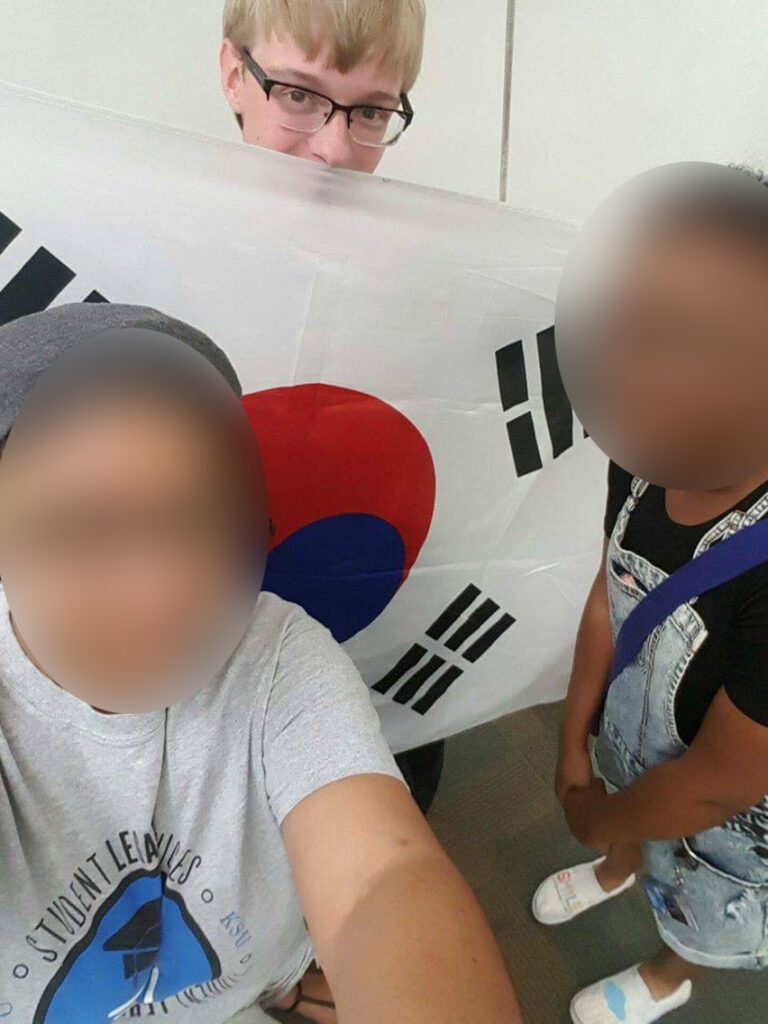
But his love for Korea extended beyond its pop culture. His focus on social issues shifted from the United States to Korea. In 2017, he came to Korea as an exchange student at Soonchunhyang University, where he spent a year studying Korean labor laws and animal protection laws. After a brief return to the U.S., he came back to Korea in June 2019, ready to teach English to Koreans.
Becoming a Worker in Korea
With his major in Chinese, Austin could have chosen to teach English in China. He even received offers from Chinese schools promising high salaries. But Austin turned them down. “I just felt closer to Korea, and I liked Korea better,” he said.
However, his life as an English teacher in Korea did not start smoothly. He had already given up the chance for a lucrative salary and wasn’t expecting to make a fortune. Still, his wages were much lower than expected. His first paycheck in Korea was around 2 million KRW (about 1,500 USD). With tens of thousands of dollars in student loans to repay, he had to send 1 million KRW (about 750 USD) to the U.S. every month. It was tough to live on the remaining amount in Korea.
Only later did he realize that his salary was equivalent to the minimum wage. He worked 209 hours a month and received a monthly salary of 2.1 million KRW, which translates to an hourly wage of around 10,000 KRW (7.5 USD). “The minimum salary for native English teachers in Korea has not changed in the past 22 years,” he told the reporter.
In reality, he worked more than that for the same pay. With overtime and extra duties, he often worked between 240 and 250 hours a month, but his salary stayed the same. When the COVID-19 pandemic hit in 2020, tuition fees at private academies increased, but the wages of native English teachers did not. “Many private academy owners don’t even follow the labor laws,” Austin explained. Once, he tried to take sick leave due to bronchitis, but his academy director refused to allow it, forcing him to teach while coughing. “Some directors even ask for money or demand that teachers find their own substitutes if they can’t come to work due to health issues,” Austin added.
Despite these hardships, Austin’s love for Korea did not waver. He still sees himself as a member of Korean society. Unlike those born in Korea, he simply came from another country to live here.
So he joined a union. In November 2022, Austin became a member of the Migrant Workers’ Union in Korea. It wasn’t just to protect his own rights. When another native English teacher approached the union for help with contract issues, Austin, who had already studied Korean labor law, provided advice and support.
The Birth of a Union for Native Teachers
For Austin, fate often seemed to guide his path. Just as he was helping native English teachers at the Migrant Workers’ Union and sensing the need for a separate union for them, the Native Teachers’ Union was established. In April 2023, a group of native English teachers in Busan took the lead in founding the union.
Austin, who lives in Cheonan, felt the need for a regional branch in Chungcheong Province. Initially, the branch operated without a designated leader. But on May 25, 2024, about a year after the union’s founding, the first Chungcheong branch chair was elected—Austin, chosen unanimously.
The union, headquartered in Busan, now has branches in Seoul and Chungcheong, with four officers, including Austin. While the Busan headquarters mainly supports native English teachers in the Yeongnam region, the Seoul and Chungcheong branches cover the Seoul metropolitan area as well as the Honam, Gangwon, and Jeju regions. This keeps Austin busy. He provides counseling to struggling teachers, helps gather evidence of labor law violations at academies, and supports filing complaints. When legal disputes escalate, he connects teachers with professional legal consultants.
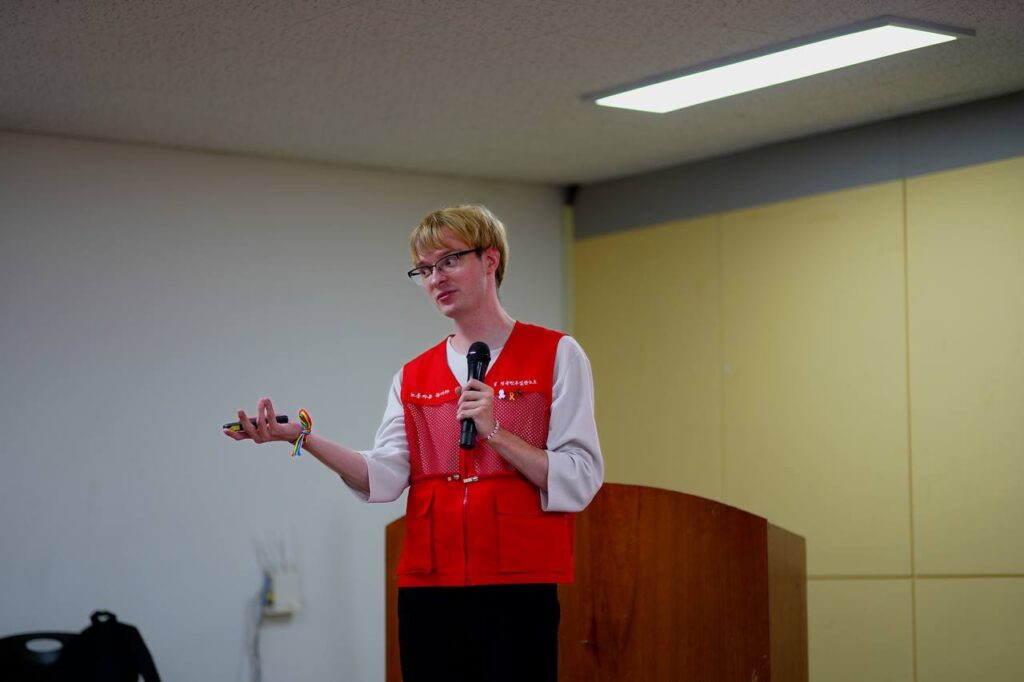
Korea is My Home
Although the union is still in its early stages, there is much work to be done. Many native English teachers do not receive severance pay even after working for years. As migrant workers, native English teachers are protected by Korean labor laws. Severance pay is a legal right, but most teachers aren’t aware of it, and employers exploit this ignorance. There are also issues with working conditions at private academies. Some require teachers to work on public holidays without paying the legally mandated holiday work compensation.
The root of these problems, Austin believes, is a common attitude in Korean society. Migrants like him are often not seen as integral members of the community, leading to discriminatory application of laws, policies, and customs.
“I’m fighting these injustices because I want to live in Korea,” Austin said. “I didn’t become a teacher in Korea just to party,” he added. His dream is not to stay temporarily but to live as a responsible member of Korean society.
Austin’s resolve to stay long-term was solidified by the Korean people themselves. He especially loves the Chungcheong region. “Chungcheong people are kind, friendly, and open-hearted. To me, all of Chungcheong feels like home,” he shared. He also formed close bonds with Green Party members in Korea, often interacting with farmers in their 50s and 60s.

A Teacher Who Steps Beyond the Classroom for the Sake of the Children
Of course, he also treasures teaching his students. They often give him little notes with messages like “Teacher, I love you. Thank you for teaching me.” Some even give him small hugs when handing over the notes. “They’re really cute and pure,” Austin said with a smile. Every time he faces a tough situation in Korea, it’s these children and his role as a teacher that keep him going.
For Austin, being a teacher is his true calling. But he believes that being an educator naturally involves caring about social issues and human rights. “If you care about children, you can’t ignore their rights. And that extends to caring about the social issues that negatively affect them,” Austin said.
From his perspective, the biggest issue Korea needs to tackle for the sake of its children is a lack of diversity. Whether it’s discriminating against teachers based on nationality and race, or marginalizing LGBTQ individuals based on sexual orientation, or ranking students solely based on test scores, Austin sees these as stemming from the same root problem. He dreams of a Korea where diversity is celebrated. Enacting an anti-discrimination law would be a crucial first step, ensuring that students grow up in an environment free from prejudice.
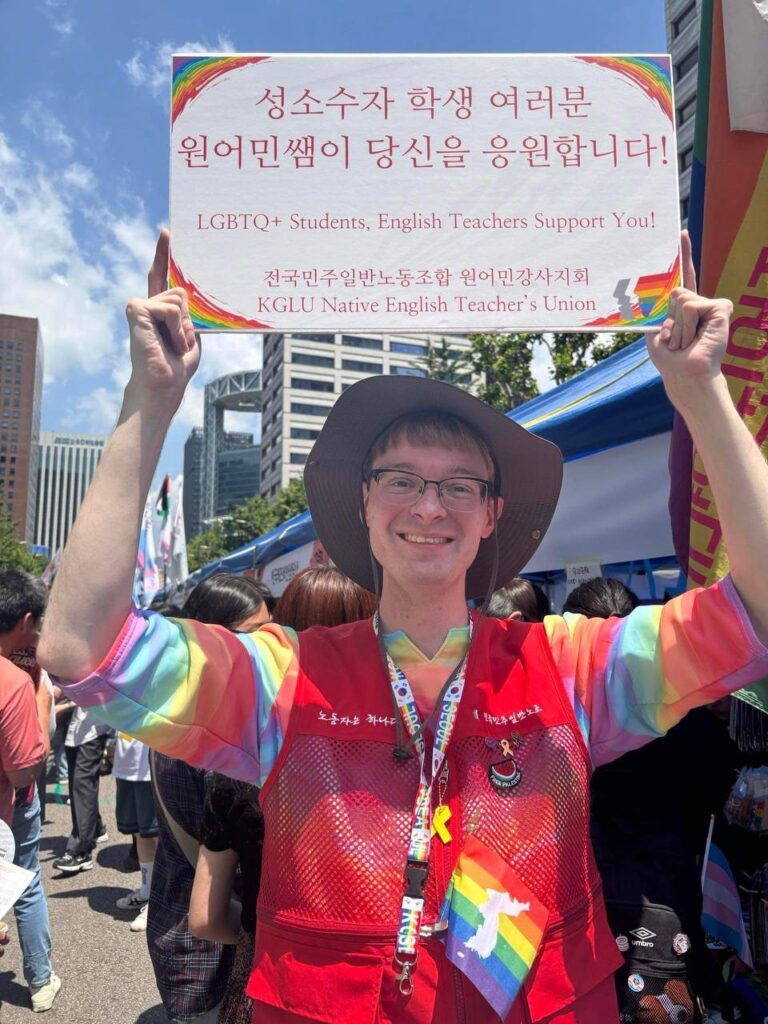
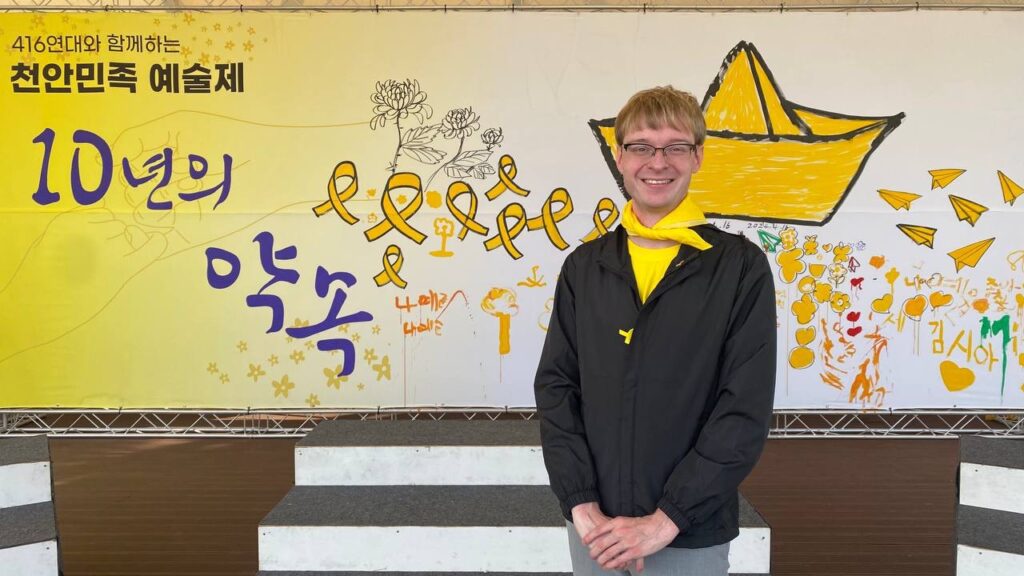
Dreaming of a Country Where Our Differences Make Us Stronger
Recently, Austin’s visa status changed. Originally holding an E-2 visa, he now has an F-2 visa. With his previous work visa, he was limited to living in accommodations provided by his employer, making it difficult to quit despite poor working conditions. His new residence visa allows him the freedom to choose his job and residence in Korea. Though he hasn’t gained Korean citizenship yet, his Korean friends already introduce him as a “Cheonan citizen” or a “Chungcheong resident.”
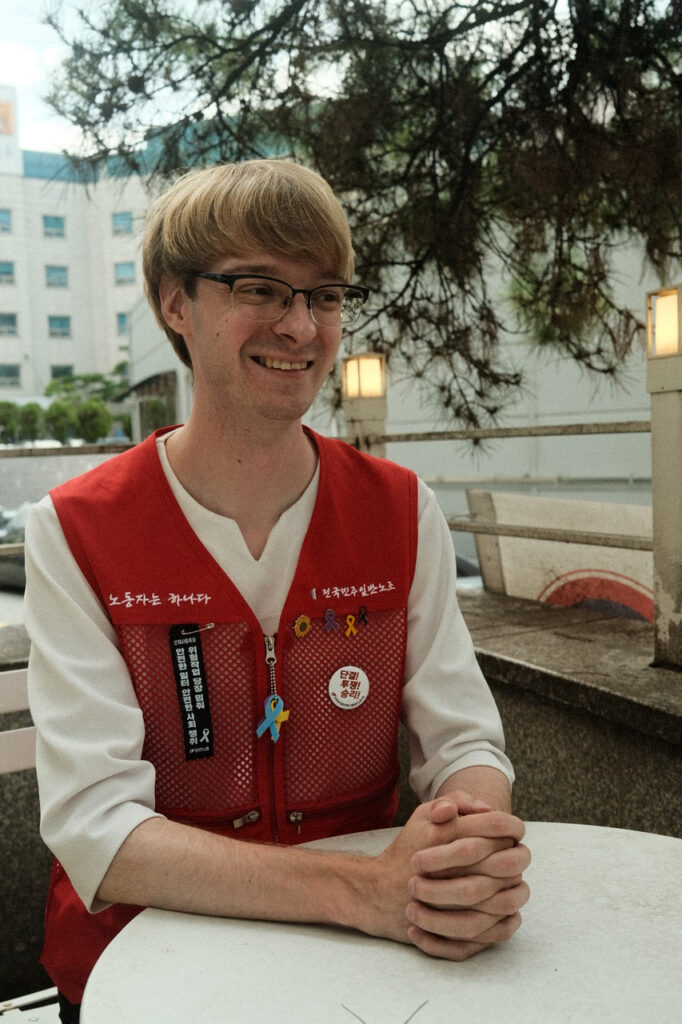
Austin’s dream is to help native teachers and other migrant workers live peacefully in Korean society. One day, he hopes to obtain Korean citizenship. And when that day comes, he has one special goal in mind: “If I become a Korean citizen, I want to open a fruit store,” he said with a smile, using his fluent Korean. “I’m not great at naming things, but I want to call it ‘Sweet and Tangy.’”
The word that describes a perfect blend of different flavors—‘sweet and tangy’—is one that Austin loves. It’s the same word that captures his dream: a world where Koreans and migrants come together to create a sweet and tangy Korea.
Editor’s Note
According to the 2021 Youth Perception Survey conducted by the market research firm Embrain Trend Monitor, 81.3% of respondents agreed that “these days, it is a difficult time for young people to live.” However, there are young individuals who refuse to be defeated by hardship. They remain positive about their lives and strive to create a better world, spreading positive influence to those around them. Danbinews has decided to call them the "Rainmaker Youth." Just like rain that falls at the perfect time after a long drought, these young people bring hope and courage to a world filled with challenges. This series introduces those exceptional individuals making a difference.
Translator's Note
This article is the latest installment in the Rainmaker Youth series and has been published with permission from Danbinews. It was originally written by Reporter Sungmin Hong ([홍성민 기자]), Youth Chief at DANBINEWS' Youth Division and Social Strategy Team. His motto is: "I will live as a reporter who loves people and truly understands them."
Original article available at: DANBINEWS (http://www.danbinews.com/news/articleView.html?idxno=27550)
For any inquiries, you can reach him at: ahong.mcs@gmail.com.

